外研版初二英语上册知识点总结
- 格式:pdf
- 大小:55.46 KB
- 文档页数:9

外研版八年级上册英语知识点归纳
以下是外研版八年级上册英语的部分知识点归纳:
1. 重点短语:
how often 多久一次
hardly ever 几乎从不
three times a week 一周三次
once a month 一个月一次
twice a week 一周两次
2. 重点句型:
How often do you exercise? 你多久锻炼一次?
I usually exercise once a week. 我通常每周锻炼一次。
How many hours do you sleep every night? 你每晚睡多少小时?
I sleep for about eight hours every night. 我每晚大约睡8个小时。
3. 重点单词:
milk 牛奶
面包 bread
水果 fruit
蔬菜 vegetables
薯片 chips
糖果 sweets
饮料 drink
4. 语法重点:频率副词和一般现在时的结合使用。
5. 学习策略:通过语境学习语法和词汇,利用语篇来提高语言运用能力。
6. 文化意识:了解不同国家的饮食和生活习惯,增强跨文化交流意识。
希望这些知识点能对你有所帮助,建议查阅外研版八年级上册的英语课本或教辅,获取更全面和准确的信息。
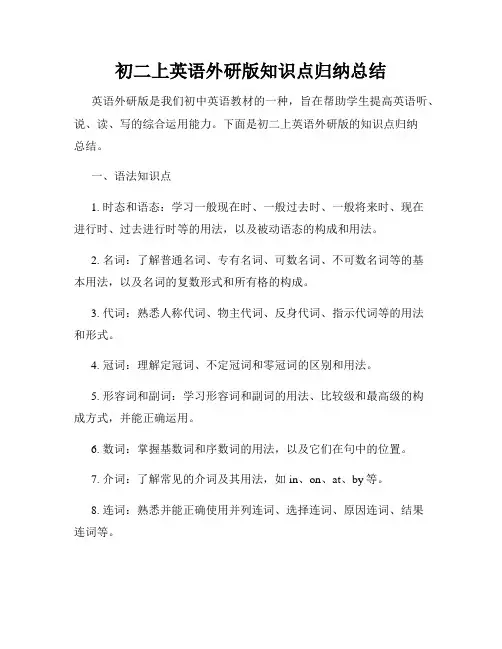
初二上英语外研版知识点归纳总结英语外研版是我们初中英语教材的一种,旨在帮助学生提高英语听、说、读、写的综合运用能力。
下面是初二上英语外研版的知识点归纳总结。
一、语法知识点1. 时态和语态:学习一般现在时、一般过去时、一般将来时、现在进行时、过去进行时等的用法,以及被动语态的构成和用法。
2. 名词:了解普通名词、专有名词、可数名词、不可数名词等的基本用法,以及名词的复数形式和所有格的构成。
3. 代词:熟悉人称代词、物主代词、反身代词、指示代词等的用法和形式。
4. 冠词:理解定冠词、不定冠词和零冠词的区别和用法。
5. 形容词和副词:学习形容词和副词的用法、比较级和最高级的构成方式,并能正确运用。
6. 数词:掌握基数词和序数词的用法,以及它们在句中的位置。
7. 介词:了解常见的介词及其用法,如in、on、at、by等。
8. 连词:熟悉并能正确使用并列连词、选择连词、原因连词、结果连词等。
9. 从句:了解主从复合句的构成和用法,包括宾语从句和定语从句等。
二、词汇知识点1. 日常生活词汇:掌握与学生日常生活密切相关的词汇,如身体部位、学科、家庭成员等。
2. 动词短语:学习常用的动词短语,如get up、go on holiday、take care等。
3. 学科词汇:了解和掌握与英语学科相关的词汇,如book、notebook、dictionary等。
4. 食物词汇:熟悉和运用与食物相关的词汇,如fruit、vegetable、meat等。
5. 动物词汇:学习各种动物的名称,如elephant、panda、tiger等。
三、阅读技巧1. 短文阅读:熟悉短文的结构,能快速获取信息和理解文章的主旨。
2. 阅读策略:掌握一些有效的阅读理解策略,如扫读、略读、细读等。
3. 理解词义:通过上下文来推断词义,提高词汇理解和运用能力。
四、听力技巧1. 日常交际:提高听懂常用的日常交际语言,如问候、道歉、提问、回答等。
2. 短对话和长对话:理解并提取对话中的关键信息,回答问题或完成任务。
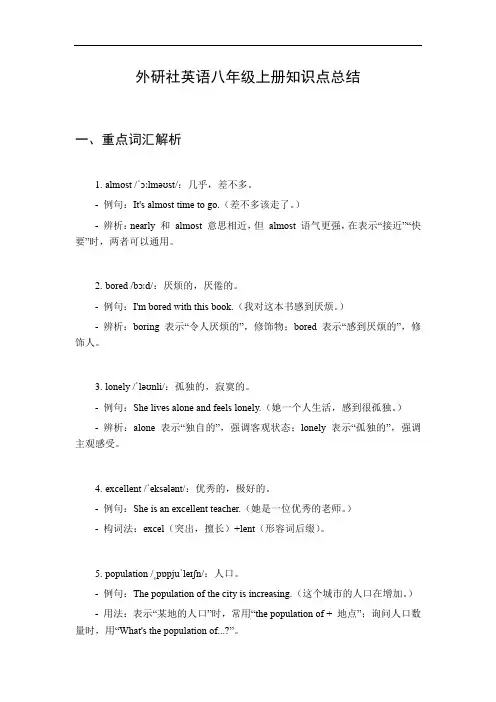
外研社英语八年级上册知识点总结一、重点词汇解析1.almost /ˈɔːlməʊst/:几乎,差不多。
-例句:It's almost time to go.(差不多该走了。
)-辨析:nearly 和almost 意思相近,但almost 语气更强,在表示“接近”“快要”时,两者可以通用。
2.bored /bɔːd/:厌烦的,厌倦的。
-例句:I'm bored with this book.(我对这本书感到厌烦。
)-辨析:boring 表示“令人厌烦的”,修饰物;bored 表示“感到厌烦的”,修饰人。
3.lonely /ˈləʊnli/:孤独的,寂寞的。
-例句:She lives alone and feels lonely.(她一个人生活,感到很孤独。
)-辨析:alone 表示“独自的”,强调客观状态;lonely 表示“孤独的”,强调主观感受。
4.excellent /ˈeksələnt/:优秀的,极好的。
-例句:She is an excellent teacher.(她是一位优秀的老师。
)-构词法:excel(突出,擅长)+lent(形容词后缀)。
5.population /ˌpɒpjuˈleɪʃn/:人口。
-例句:The population of the city is increasing.(这个城市的人口在增加。
)-用法:表示“某地的人口”时,常用“the population of + 地点”;询问人口数量时,用“What's the population of...?”。
二、重点短语1.quite a few:相当多,不少。
-例句:There are quite a few people in the park.(公园里有相当多的人。
)2.of course:当然,自然。
-例句:—Can I borrow your pen? —Of course.(—我能借你的笔吗?—当然可以。
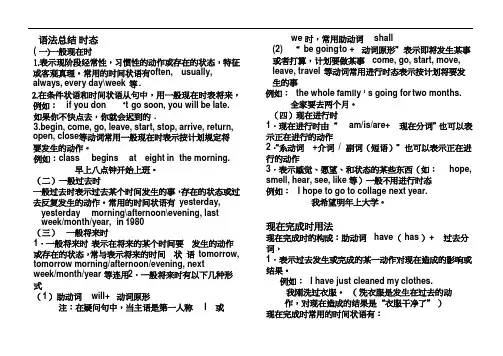
语法总结时态( 一)一般现在时1.表示现阶段经常性,习惯性的动作或存在的状态,特征或客观真理。
常用的时间状语有often, usually, always, every day\week 等.2.在条件状语和时间状语从句中,用一般现在时表将来,例如:if you don ‘t go soon, you will be late.如果你不快点去,你就会迟到的.3.begin, come, go, leave, start, stop, arrive, return, open, close等动词常用一般现在时表示按计划规定将要发生的动作。
例如:class begins at eight in the morning.早上八点钟开始上班。
(二)一般过去时一般过去时表示过去某个时间发生的事,存在的状态或过去反复发生的动作。
常用的时间状语有yesterday,yesterday morning\afternoon\evening, lastweek/month/year, in 1980(三)一般将来时1.一般将来时表示在将来的某个时间要发生的动作或存在的状态,常与表示将来的时间状语tomorrow, tomorrow morning/afternoon/evening, nextweek/month/year 等连用2.一般将来时有以下几种形式(1)助动词will+ 动词原形注:在疑问句中,当主语是第一人称I 或we 时,常用助动词shall(2) “be going t o + 动词原形”表示即将发生某事或者打算,计划要做某事come, go, start, move, leave, travel 等动词常用进行时态表示按计划将要发生的事例如:the whole family ‘ s going for two months.全家要去两个月。
(四)现在进行时1.现在进行时由“am/is/are+ 现在分词”也可以表示正在进行的动作2.“系动词+介词/ 副词(短语)”也可以表示正在进行的动作3.表示感觉、愿望、和状态的某些东西(如:hope, smell, hear, see, like 等)一般不用进行时态例如:I hope to go to collage next year.我希望明年上大学。
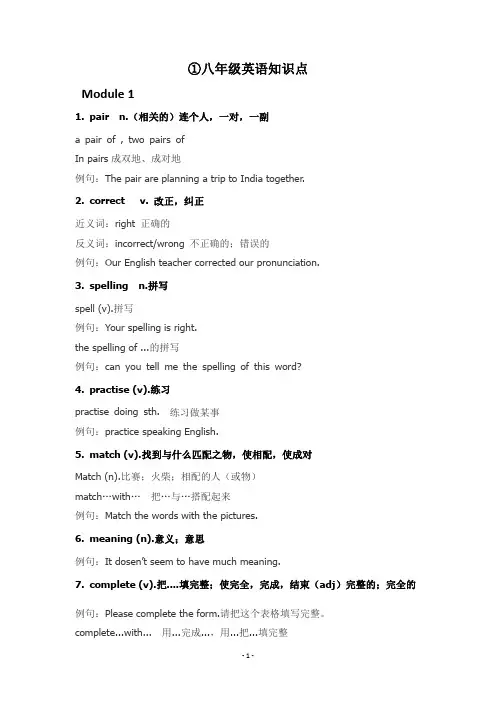
①八年级英语知识点Module11.pair n.(相关的)连个人,一对,一副a pair of,two pairs ofIn pairs成双地、成对地例句:The pair are planning a trip to India together.2.correct v.改正,纠正近义词:right正确的反义词:incorrect/wrong不正确的;错误的例句:Our English teacher corrected our pronunciation.3.spelling n.拼写spell(v).拼写例句:Your spelling is right.the spelling of...的拼写例句:can you tell me the spelling of this word?4.practise(v).练习practise doing sth.练习做某事例句:practice speaking English.5.match(v).找到与什么匹配之物,使相配,使成对Match(n).比赛;火柴;相配的人(或物)match…with…把…与…搭配起来例句:Match the words with the pictures.6.meaning(n).意义;意思例句:It dosen’t seem to have much meaning.plete(v).把....填完整;使完全,完成,结束(adj)完整的;完全的例句:Please complete the form.请把这个表格填写完整。
complete...with...用...完成...,用...把...填完整例句:I completed the job with a new method.Complete the sentences with the words in the box。
用方框中的单词把句子填完整。
8.talk(v).说话;讨论;讲,说;说闲话n.交谈;讨论;报告;空话(1)talk about(vt).讲(谈论,交谈)例句:Please don't talk about it in front of the children.(2)talk to对某人说话(强调单独和某人谈)例句:He stopped to talk to me when seeing me.(3)talk with和...交谈(强调大伙儿一起谈,谈论)例句:I'd like to talk with you.我想和你谈谈。
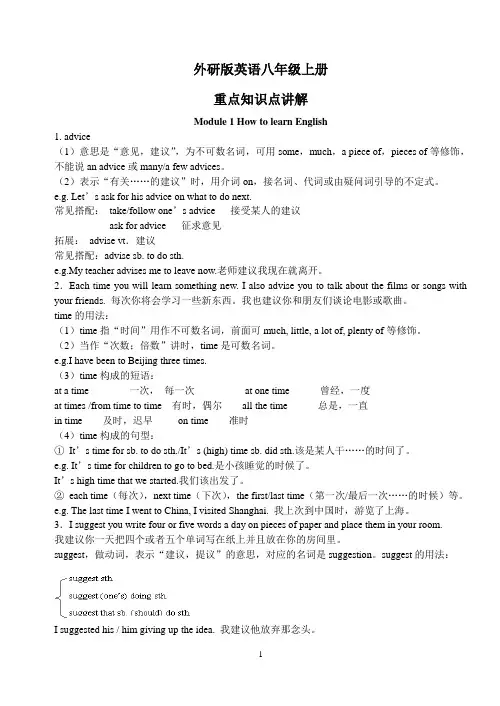
外研版英语八年级上册重点知识点讲解Module 1 How to learn English1. advice(1)意思是“意见,建议”,为不可数名词,可用some,much,a piece of,pieces of等修饰,不能说an advice或many/a few advices。
(2)表示“有关……的建议”时,用介词on,接名词、代词或由疑问词引导的不定式。
e.g. Let’s ask for his advice on what to do next.常见搭配:take/follow one’s advice接受某人的建议ask for advice 征求意见拓展:advise vt.建议常见搭配:advise sb. to do sth.e.g.My teacher advises me to leave now.老师建议我现在就离开。
2.Each time you will learn something new. I also advise you to talk about the films or songs with your friends. 每次你将会学习一些新东西。
我也建议你和朋友们谈论电影或歌曲。
time的用法:(1)time指“时间”用作不可数名词,前面可much, little, a lot of, plenty of等修饰。
(2)当作“次数;倍数”讲时,time是可数名词。
e.g.I have been to Beijing three times.(3)time构成的短语:at a time一次,每一次at one time曾经,一度at times /from time to time有时,偶尔all the time总是,一直in time及时,迟早on time准时(4)time构成的句型:①It’s time for sb. to do sth./It’s (high) time sb. did sth.该是某人干……的时间了。

最新外研版英语八年级上册知识点总结
(精华版)
1. 语法知识点
- 时态:包括一般现在时、一般过去时、一般将来时等;
- 基本句型:包括陈述句、疑问句、否定句等;
- 名词:包括可数名词、不可数名词、复数形式等;
- 代词:包括人称代词、物主代词、反身代词等;
- 形容词:包括形容词的比较级和最高级等;
- 副词:包括副词的用法和位置等;
- 连词:包括并列连词、选择连词、从属连词等;
- 介词:包括基本介词和常用介词短语等;
- 动词:包括动词的不同形式、时态和语态等;
- 句子结构:包括主谓结构、主语从句、宾语从句等;
- 非谓语动词:包括动词不定式、动名词和分词等;
2. 词汇知识点
- 单词拼写:包括常见的单词拼写错误;
- 同义词:包括一些常见的同义词辨析;
- 常用短语:包括日常交际中常用的短语;
- 常用惯用语:包括一些惯用语的正确使用;
3. 阅读技巧
- 阅读理解:包括快速阅读和细节理解;
- 阅读速度:包括提高阅读速度和理解能力的方法;
- 阅读技巧:包括推测词义、寻找关键词等技巧;
4. 写作技巧
- 书信写作:包括格式、语言表达和常用句型等;
- 日记写作:包括表达个人感受和经历的方法;
- 作文写作:包括如何组织思路和提高写作水平的方法;
以上是最新外研版英语八年级上册的知识点总结,希望对你的研究有所帮助。

八年级上册英语外研版知识点一、重点短语1. how far 距离多远2. take the bus 乘公共汽车3. get to school 到校4. spend time 花时间5. go to the zoo 去动物园6. the more,the better 越多越好7. come true 实现8. have a good time 玩得开心9. look like 看起来像10. be ready 准备好了11. would like to do sth 想要做某事12. as a result 结果13. too…to 太……而不能14. on the one hand 在一方面15. be/get ready for 对……做好准备16. in the middle of 在……中间17. make/let sb do sth 让某人做某事18. on the weekend 在周末19. be able to 能够20. be afraid of 害怕21. have a good/bad day 过得开心/糟糕22. be careful 当心,小心23. be covered with 被……覆盖24. be famous for 因……而著名25. be full of 充满……的26. feel/seem/look+adj 看起来……27. in the sky/on the ground 在天上/在地上28. in the future 在将来29. in the sun 在阳光下30. be sure to do sth 确定做某事31. of course 当然了32. on fire 着火33. be late for迟到34. on time准时35. go shopping去购物36. be different from与……不同37. be similar to与……相似38. have a picnic野炊39. much too太……40. instead代替;反而,却41. none一点儿也没有,毫无42. all day整天,一整天,一整天;整日,终日。

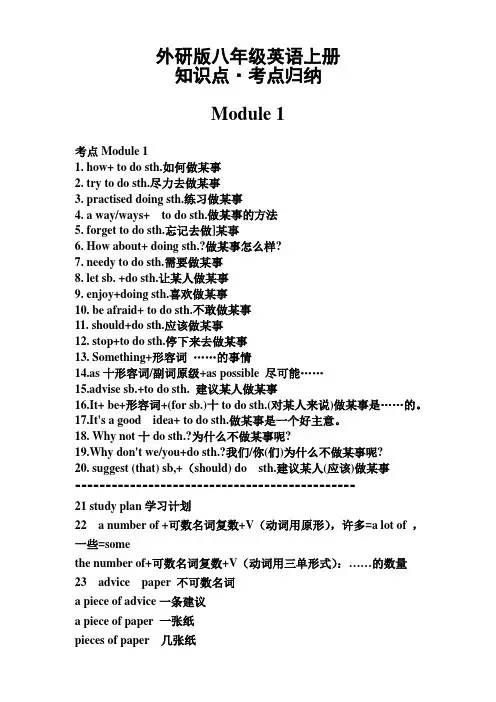
外研版八年级英语上册知识点·考点归纳Module 1考点Module 11. how+ to do sth.如何做某事2. try to do sth.尽力去做某事3. practised doing sth.练习做某事4. a way/ways+ to do sth.做某事的方法5. forget to do sth.忘记去做]某事6. How about+ doing sth.?做某事怎么样?7. needy to do sth.需要做某事8. let sb. +do sth.让某人做某事9. enjoy+doing sth.喜欢做某事10. be afraid+ to do sth.不敢做某事11. should+do sth.应该做某事12. stop+to do sth.停下来去做某事13. Something+形容词……的事情14.as十形容词/副词原级+as possible 尽可能……15.advise sb.+to do sth. 建议某人做某事16.It+ be+形容词+(for sb.)十to do sth.(对某人来说)做某事是……的。
17.It's a good idea+ to do sth.做某事是一个好主意。
18. Why not十do sth.?为什么不做某事呢?19.Why don't we/you+do sth.?我们/你(们)为什么不做某事呢?20. suggest (that) sb,+(should) do sth.建议某人(应该)做某事----------------------------------------------21 study plan学习计划22 a number of +可数名词复数+V(动词用原形),许多=a lot of ,一些=somethe number of+可数名词复数+V(动词用三单形式):……的数量23 advice paper 不可数名词a piece of advice一条建议a piece of paper 一张纸pieces of paper 几张纸give sb. some advice给某人一些建议advise sb. to do sth.建议某人去做某事24 write it/them down把它写下来25 what else?还有什么其他的?26 It is adj. (for sb. )to do sth.(对某人来说)做某事怎么样It is difficult for old people to learn English well.某人做某事某人怎么样It is adj. (of sb.) to do sth.It is very kind of you to help me.27 It is a good idea\way to do sth.做某事时个好主意、好办法。
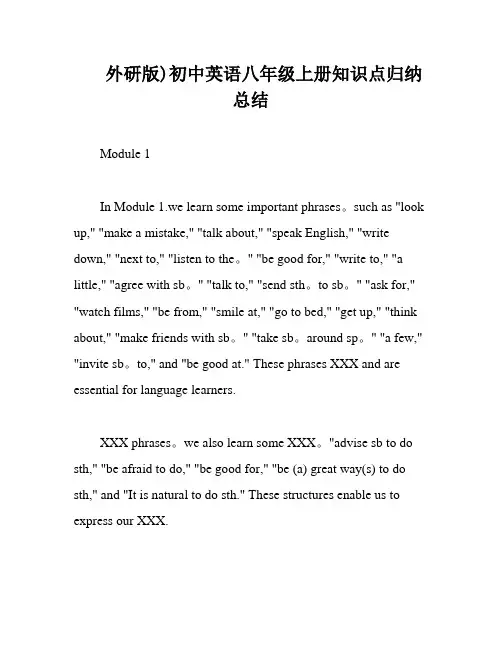
外研版)初中英语八年级上册知识点归纳总结Module 1In Module 1.we learn some important phrases。
such as "look up," "make a mistake," "talk about," "speak English," "write down," "next to," "listen to the。
" "be good for," "write to," "a little," "agree with sb。
" "talk to," "send sth。
to sb。
" "ask for," "watch films," "be from," "smile at," "go to bed," "get up," "think about," "make friends with sb。
" "take sb。
around sp。
" "a few," "invite sb。
to," and "be good at." These phrases XXX and are essential for language learners.XXX phrases。
we also learn some XXX。
"advise sb to do sth," "be afraid to do," "be good for," "be (a) great way(s) to do sth," and "It is natural to do sth." These structures enable us to express our XXX.Finally。
(外研版)初中英语八年级上册知识点归纳总结Module 1一、重点短语1. look up 查;查找2. make a mistake 犯错误3. talk about 谈论;讨论4. speak English 讲英语5. write down 写下;记下6. next to 在……旁边;紧挨着7. listen to the radio 听广播8. be good for 对……有好处9. write to 给……写信10. a little 有点11. agree with sb. 同意某人12. talk to 跟……交谈13. send sth. to sb. 把某物(发)送给某人14. ask for 请求15. watch films 看电影16. be from 来自17. smile at 冲……微笑18. go to bed 去睡觉19. get up 起床20. think about 考虑21. make friends with sb. 与某人交朋友22. take sb. around sp. 带领某人参观某地23. a few 几个;一些24. invite sb. to 邀请某人到……25. be good at 擅长26. for example 例如二、重点句型1. advise sb to do sth 建议某人做某事2. be afraid to... 害怕做……3. be good for... 对……有好处的4. be (a) great way(s) to do sth 做……的(一种)好方法5. It is natural to do sth. 做某事是合乎常情的。
三、重点语法1. Why not...? = Why don’t + you (we / they...)...?意为“为什么不……呢?”,后接动词原形。
eg:Why not / Why don’t we help the old cleantheir rooms this afternoon?今天下午为什么不去帮助老人打扫房间呢?2. What / How about...? 意为“……怎么样?”,其中about 是介词,后接名词或动词-ing 形式。
外研版八年级上英语各模块知识点汇总Module1 How to learn English 模块知识清单一、重点词组1、talk about 谈论,谈及2、that’s a good idea 好主意3、agree with somebody 同意,和…意见一致4、look up 查阅,仰望,向上看5、make a mistake 犯错误6、as much as possible 尽可能多地7、write to somebody 给某人写信8、write down 写下9、try to do 尽力做某事10、how/What about+ doing 做…怎么样11、why not/don’t you+ do 为什么不…12、should/can do 应该/能够做某事13、ask for advice 征求意见14、advise somebody to do something15、suggest somebody (should) do 建议某人做某事16、be afraid to do 害怕做某事17、start a conversation 开始交谈18、be good at doing=do well in doing 擅长做某事19、let’s try to do something 让我们努力做20、It’s a good idea to do 做…是个好主意21、remember to do 记得做某事22、practice doing 练习做某事23、make friends with 和…交朋友24、invite somebody to someplace 邀请某人去…25、make plans 制定计划二、重点句型1、We should always speak English in class.情态动词should /shouldn’t ,should 表示应该shouldn’t不应该You should speak English every day.He shouldn’t tell you the bad news.2、Don’t forget to write down the correct answers next to the mistakes. What else? write down 写下记下代词必须放在两个词之间名词可以放在中间也可以放在末尾如write it down (正)write the sentence down (正)write down it (误)write down the sentence (正)类似的短语有: put on pick up 等next to 紧挨着、紧靠着The little boy sat next to his mother.My home is next to a bank. 【同义词】near 在附近3、Many students ask for advice about how to improve their English。
以下是八年级上册外研社版英语知识点归纳:1. 重点短语:(1) how often 多久一次(2) as for 至于(3) on weekends 在周末(4) most of the time 大部分时间(5) practice doing sth. 练习做某事(6) spend time doing sth. 花时间做某事(7) go to the movies 看电影(8) look after 照顾(9) stay healthy 保持健康(10) get a headache 头疼2. 重点句型:(1) What do you usually do on weekends? 你通常在周末做什么?(2) How often do you exercise? 你多久锻炼一次?(3) I usually read books at home on weekends. 我通常在周末在家看书。
(4) My eating habits are different from his. 我的饮食习惯和他不同。
3. 语法知识:(1) 现在进行时表示正在进行的动作或存在的状态,常与now,listen,look等词连用。
结构是be动词+动词的ing形式。
如:I am doing my homework now. 我正在写作业。
(2) 现在进行时的一般疑问句和否定句的变化:把be动词提前,变成一般疑问句;在be动词后加not,变成否定句。
如:Are you playing football? 你们在踢足球吗?-No,we are not. 不,我们没有。
(3) 频度副词:表示动作发生的频率,如:always,often,sometimes,never等。
如:How often do youwatch TV? 你多久看一次电视?。
外研社英语8年级上册知识点归纳外研社英语8年级上册知识点归纳第一部分:语法1. 一般现在时一般现在时表示经常性的或习惯性的动作,或者表示客观事实等。
例如:I usually get up at six in the morning.Water boils at hundred degrees Celsius.2. 一般过去时一般过去时表示已经发生了的动作或状态。
例如:I met him yesterday.He didn’t go to the party last night.3. 现在进行时现在进行时表示正在进行的动作。
例如:I am watching TV right now.They are having dinner together.4. 一般将来时一般将来时表示将来时发生的事。
例如:I will stay at home tomorrow.She won’t come to the meeting.5. 情态动词的用法情态动词包括 can、may、must、shall、should、will等。
它们用来表示一种语气、情态或者家庭中发生的事情。
例如:We should study hard for the exam.You must finish your homework before dinner.第二部分:词汇1. 动物动物类词汇,包括常见动物、动物的身体部位、动物的饲养和保护等。
例如:cat、dog、panda、lion、neck、tail、pet、zoo、wildlife等。
2. 食物食物类词汇,包括早餐、午餐、晚餐、小吃、饮品等。
例如:toast、milk、coffee、hamburger、pizza、salad等。
3. 旅行用语旅行用语类词汇,包括交通工具、旅行目的地、旅行中使用的语言等。
例如:by plane、train、bus、boat、beach、museum、souvenir等。
外研版英语八年级上册重要知识点归纳总结1. 英语中的“花费”spend : sb. spend some time on sth.某人花费时间做某事sb. spend some time (in) doing sth. 某人花费时间做某事sb. spend some money on sth. 某人花费钱买某物sb. spend some money (in) buying sth.某人花费钱买某物cost: sth . cost sb. some money 某物花去某人钱pay: sb. pay some money for sth. 某人支付钱take: It takes (took) sb. some time to do sth.做某事花去某人时间2.the number of“…的数目”,后跟名词复数,动词用三单, a number of =many,“大量,许多”后跟名词复数,动词用复数形式。
(a large number of,a small number of )3.英语中的“四说”(1)speak说语言,(2)say说内容,(3)talk与谁说,(4)tell告诉,讲述.speak to sb 和某人讲话,say hello to sb. 向某人问好,to sb.向某人说再见,英语中的“四看”(1)watch观看电视、戏剧、比赛和表演,(2)see看人、电影、医生、风景,(3)read看书,看报,(4)look看黑板、看某物。
4.It is +adj.+of sb +to do sth.写性格,品质,如:kind, good, nice , right, wrong, clever, careless, polite, foolish等。
It is+adj+for sb +to do sth. 对物的评价,如:difficult ,easy hard, dangerous, important,等5.表示“建议”的句型:(1). why don't you do sth?=why not do sth?(2). How about doing sth?=what about doing sth?(3). You should /can do sth.(4). Remember to do sth.(5)Don't forget to do sth.(6). can you do sth ?(7). Let's do sth.(8). It'sa good idea to do sth.(9).would you like to do sth.?(10).Shall we do…?(11)You’d better(not) do sth.回答:Thanks a lot.Great/ OK.That's right.All right.Good idea.Sure.6.形容词修饰不定代词somebody, some one“某人”,anybody,anyone “任何人”nobody,no one,“没人”,everyone,everybody“每个人”,something“某物”,anything“任何物”,nothing“没事”,everything “一切事物”时,要放在他们的后面(即后置)。
1. 介词:介词用于连接名词或代词与其前面的词,并表达它们之间的关系,常见的介词有in, on, at, under, above, below等。
2. 冠词:冠词用于限定名词的范围,包括定冠词the和不定冠词a/an。
3.形容词和副词的比较级和最高级:形容词和副词的比较级用于表示两者之间的比较,最高级则用于表示三者或三者以上之间的比较。
4. 不规则动词:有些动词的过去式和过去分词形式不规则,常见的不规则动词包括go-went-gone, eat-ate-eaten, see-saw-seen等。
5.句子的基本结构:英语句子的基本结构是主语+谓语+宾语,其中谓语可以是及物动词或不及物动词。
6. 物主代词:物主代词用于表示所有关系,包括我的mine,你的yours,他的his等。
7.时态:英语中有三大时态,一般现在时,一般过去时和一般将来时,表示动作的发生时间。
8.句型的变换:英语句子的结构可以根据需要进行变换,包括肯定句、否定句、疑问句以及选择疑问句等。
9.数词和数量表达方式:英语中有基数词和序数词,分别用于表示数量和顺序。
10.比较级和最高级的句型:比较级和最高级可以用于构成表示比较的句子,包括as…as, not as…as, the+比较级…the…等句型。
11.数词和时态的表达方式:英语中可以用数词和时态来表达一些动作发生的频率,如once a week, twice a month等。
12.情态动词:情态动词用于表示说话人的态度、意愿、能力、推测等,常见的情态动词包括can, could, may, might, must, should等。
13.虚拟语气:虚拟语气用于表示与事实相反或不可能实现的情况,包括与过去事实相反的虚拟语气以及祝愿,建议等虚拟语气。
14.被动语态:被动语态用于表达动作的承受者,句子的主语成为动作的接受者,谓语动词由"be"加上动词的过去分词构成。
外研版初二英语上册知识点总结MODULE1 1、如有always ,often, usually, sometimes, seldom, never, once a....,every...用一般现在时,第一、二人称复数后跟动词原形,第三人称单数后跟动词加's'/'es'。
2、如有now ,look! ,listen, at the moment ....用现在进行时,结构是be (am, is, are) +v-ing3、如有tomorrow, the day after tomorrow, from now on, in +一段时间, some day, next....用一般将来时,结构:will + v原\ be going to +v原(没有动词用be )4、如有yesterday, ......ago , last....just now.....用一般过去时动词加edgive sb. Sth.=give sth. to sb. 给某人某物every day每天,write down 写下,记下write it (them) down everyday每天的,日常的,how about doing sth.=what about doing sth.做....怎么样each other 互相. thanks a lot= thank you very much非常谢谢回答That's all right. =You're welcome.= That'OK.= It's my pleasure.=Not at all.Why don't you+V原...=why not+...V原为什么不help sb. with sth. 在某方面帮助别人help sb. (to )do sth.帮助某人做某事with one's help=with the help of sb.在某人的帮助help oneself to sth.请自用食物watch sb. do sth. 看到某人做了某事,(现在没有做,做过)watch sb. doing sth.看到某人正在做某事(正在做)see, hear类似remember to do sth.想起记得要做某事,未做事remember doing sth.相起记得做过某事forget to do sth. 忘记要做某事forget doing sth.忘记做过某事welcome back欢迎回来, new term新学期this term这学期, next term 下学学期,last term上学期, give you some advice给你一些建议, why not 为什么不, make a mistake=make mistakes犯错误, correct spelling正确的拼写, what else?=what other things? 还有什么a piece of advice 一条建议, follow /take one's advice采用别人的建议, send sth to sb.=send sb. sth. 寄给某人send for派人去请/取send up发射. all the time一直enjoy oneself=have a good time=have a great time=have fun, 玩得愉快lots of =a lot of =many(可数)\much(不可数)许多, ,spend : sb. spend some time on sth.某人花费时间做某事sb. spend some time (in) doing sth. 某人花费时间做某事Sb. spend some money on sth. 某人花费钱买某物Sb. spend some money (in) buying sth.某人花费钱买某物Cost: sth. cost sb. some money 某物花去某人钱pay: sb. pay some money for sth. 某人支付钱Take: It takes (took) sb.some time to do sth.做某事花去某人时间ask for 请求,要求, ask sb. for sth.向某人要某物ask sb. to do sth.要求某人做某事 a piece of一块enjoy doing sth喜欢做某事.finish,practise, mind, miss ,consider,keep, continue,这些词语后跟动名词形式V-ingplace sth.in =put sth. in 把某物放在…里面else常修饰不定代词,关系代词或副词,也可修饰all, much,little等,else要位于其后。
所有格为else's.take a deep breath深呼吸, catch\hold one's breath屏住呼吸,out of breath上气不接下气, wish sb. to do sth.希望某人做某事,the number of …的数目,后跟名词复数,动词用三单, a number of =many,大量,许多后跟名词复数,动词用复数形式。
a large number of,a small number of ,invite sb.to do sth. 邀请某人做某事find+ it+ adj+to do sth.发现做某事怎么样try to do sth.尽力做事try doing sth. 尝试做某事try not to do sth .尽力不做某事try one's best尽某人最大的努力,a group of 一组,一群, borrow sth from sb.从某人处借入某物,lend sth.to sb=lend sb.sth.借给某人某物keep借一段时间practice doing sth.,练习做做某事come from=be from来自,look for 寻找, look after=care for=take care of照顾look up 向上看,查阅, look like看起来像,look at 看着, look on sb. as把某人看作,look forward to doing sth. 盼望,期待做某事look over检查,翻阅, look out当心,向外看, look through仔细查看,be ready for =get ready for=prepare for为…, be ready准备好,be (get ) ready to do sth.准备做某事,乐意做某事translate…into…将…译成…,take a message捎个信,leave a message留个信,be good for 对…有好处,be good at =do well in擅长于…be poor at =be bad at =do badly in=be weak in不擅长… Think of 想起,think about想出,think over仔细考虑,else修饰不定代词something,everything,anything,nothing,somebody,anybody, nobody和who, what,when,where时放后,四说,1,speak说语言,2.say说内容,3,talk与谁说,4,tell告诉,讲述,四看,1,watch观看电视,比赛和表演,2,see看人,电影,医生,风景,3,read看书,报,4,look就看。
看场电影要用see,读书看报用read 电视、戏剧、比赛,凡是表演用watch,observe细观察,一时注意用notice. make+宾语+补足语(形容词)使某人某物怎么样。
.make+宾语+do 让某人做某事make+宾语+过去分词使某人被怎么样;make friends with sb.与某人交朋友,hear of听说,hear from收到某人的来信,be bad for对…有害,it is +adj.+of sb +to do sth.写性格,品质 kind, goodnice ,right,wrong,clever,careless,polite,foolish等。
It is+adj+for sb +to do sth. 对物的评价difficult,easy hard,dangerous,important,等write to…给…写信,next to 在…旁边,do some concerts办音乐会,speak to sb.和某人讲话,say hello to sb. 给某人问好,say bye to sb.向某人说再见,show sb. around somewhere带某人参观某地,learn sth from sb.向某人学习choose the correct answers选择正确答案, correct the mistakes改错,match …with…把…和…搭配起来建议:1.why don't you do sth?=why not do sth?2.How about doing sth?=what about doing sth?3.You should /can do sth.4.Remember to do sth.5.Don't forget to do sth.6.can you do sth ?7.Let's do sth. 8.It'sa good idea to do9.would you like to do ? 10.Shall we do11.You'd better (not )do sth.回答:That's a good idea.Thanks a lot.Great, OK. That's right. All right. Good idea. Sure.MODULE2现在完成时:1.表示过去发生的动作对现在造成的影响,或结果,常与recently, ever, never,already,yet ,just,before still连用;2.表示发生在过去并且一直持续到现在的动作或状态,常与for+时间段或since+时间点连用。
结构:have(has)+过去分词,get into=enter进入, what's the price of …=how much is …问价格dream about梦到, dream of 梦见,around the world=all over the world全世界, stay with sb.与某人呆一起stay in bed呆在床上, stay at home呆在家里,take off 脱下,起飞, land on/in /at 着路,all over China,全中国, take a seat =have a seat请坐,come ture实现, fly to =go to ...by plane(by air),坐飞机步行去drive to =go to …by car开车,walk to =go to…on footsell out 卖光, at the end 在结束时, at the end of在…尽头/结尾, have been to去过(现在不在那儿), have gone to 去了(现在不在说话地)everyday English日常英语,first price一等奖,The most exciting experience最激动人心的经历,before long不久,long before=soon=a little later很久以前,no problem没问题,have a problem in doing sth.做某事有困难,work out a problem解决一个问题,invite sb to do sth,邀请某人做某事invite sb to some place邀请某人去某地, one day,某一天,(过去或将来)some day某一天(将来),连系动词,一是be (am, is ,are ,was ,were,)一感觉feel ,一保持keep,三变become,get turn,四起来taste ,smell , look, sound,后跟形容词作表语。